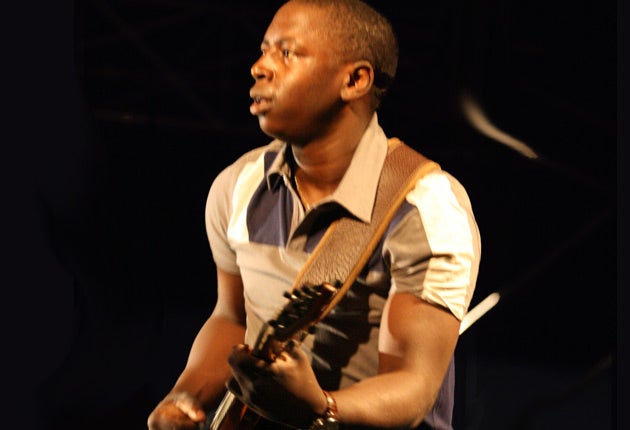
Your support helps us to tell the story
From reproductive rights to climate change to Big Tech, The Independent is on the ground when the story is developing. Whether it's investigating the financials of Elon Musk's pro-Trump PAC or producing our latest documentary, 'The A Word', which shines a light on the American women fighting for reproductive rights, we know how important it is to parse out the facts from the messaging.
At such a critical moment in US history, we need reporters on the ground. Your donation allows us to keep sending journalists to speak to both sides of the story.
The Independent is trusted by Americans across the entire political spectrum. And unlike many other quality news outlets, we choose not to lock Americans out of our reporting and analysis with paywalls. We believe quality journalism should be available to everyone, paid for by those who can afford it.
Your support makes all the difference.There is a saying in West African, “Honte a celui qui ne fait pas mieux que son père” (“Shame on him that does not achieve more than his father”).
This was always going to be a tall order for Vieux Farka Touré, son of legendary Malian musician Ali Farka Touré, but in June he will step out of his late father's shadow and on to the stage in front of a global audience of a billion. Playing at the World Cup opening concert along side artists including Shakira, the Black Eyed Peas, Alicia Keys and his sister Angelique Kidjo will be the highlight of his musical career but it does not phase Farka Touré. “I am very proud to be playing in South Africa” he says. “Someone asked me if it will be hard being there when the Malian team didn't make it and I said, 'But a Malian team is there: me, Tinariwen and Amadou & Mariam! The only difference we play with our fingers not our feet!'
Although Dingwalls in Camden is a far cry from Johannesburg's Soccer City stadium Farka Touré appears to be enjoying the intimate setting. He is relaxed and cheerful despite a grueling tour schedule, starting his set gently with a song called 'Slow Jam' before gradually moving up the gears to finish an electrifying set with the infectious 'Awei Womei'.
Nicknamed 'the Hendrix of the Sahara' Farka Touré blends desert-blues with rock, reggae, funk and R&B. Combining strong catchy baselines with intricate guitar work and gentle vocals he seamlessly fuses traditional Malian music with modern instrumentation to produce a distinctive trancey sound. Unlike the some desert blues which is raw and deliberately dissonant, Farka Touré's sound is rich and warm. His songs are heavily instrumental and at times he drifts into wonderful labyrinthine guitar improvisations that last a full five minutes.
Although comparisons with Ali Farka Touré are inevitable and although at times his style is reminiscent of that of his father, Vieux's sound is very much his own.
Ali Farka Touré did not encourage his son to become a musician and indeed the young Vieux spent a year in the army before persuading his father to allow him to pursue a career in music. Growing up in the tranquil town of Niafunké on the banks of the river Niger, Vieux was not even aware that his father was famous until he was about 15 when he travelled with him outside of Mali. “For me he was just my father” he says. Vieux holds his father's legacy in great respect and two members of his band, Aly Magassa (acoustic guitar) and Souleymane Kane (djembe, calabash) used to play with his dad. “In fact my father taught Aly to play guitar” laughs Vieux.
Singing in his native Bambara, Farka Touré's songs touch on universal themes of love and life and are unerringly uplifting. The moving and hypnotic song, 'Fafa', encapsulates this much of what underpins his music. “The notion of 'fafa' in our culture is very fundamental and profound.” Farka Touré explains. “It is the deepest, strongest bond between humans. It’s stronger than blood; stronger than any family tie.” Coming from a long Griot tradition, Farak Touré is aware of the importance of imparting knowledge through his music. "A large part of our history is carried across generations by music” explains Farka Touré. “Our music and history are deeply intertwined and are an essential part of who we are.” 'Wale', a traditional song, tells the story of the married women of Timbuktu and the upbeat 'Souba Souba' explores the the choices we have in life. “I don’t think I could write music without telling a story” says Farka Touré. Fortunately he assures me, Vieux has many many stories still to tell.
Join our commenting forum
Join thought-provoking conversations, follow other Independent readers and see their replies
Comments